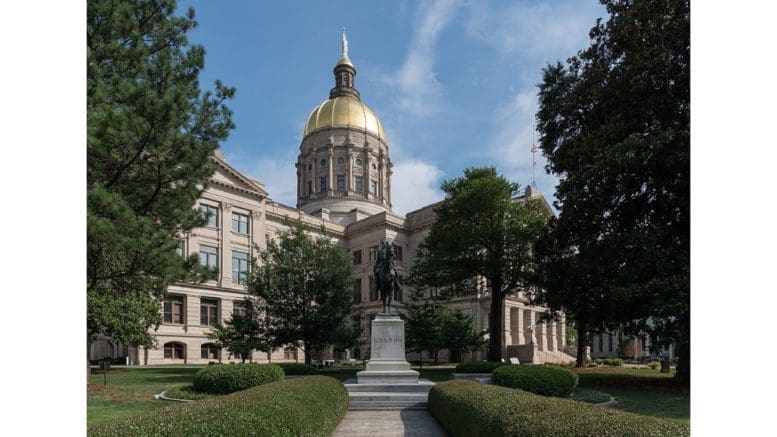by Stanley Dunlap, Georgia Recorder [This article first appeared in the Georgia Recorder, republished with permission]
January 30, 2024
A bill that authorizes a new commission to review complaints filed against district attorneys passed the state House chamber 95-75 on Monday.
Following Monday’s vote, Republican-sponsored House Bill 881 heads to the state Senate to decide if it’ll approve the new rulemaking process for a Professional Attorneys Qualifications Commission that has been unable to review cases since the state Supreme Court refused last year to adopt its rules. Those who support the controversial plan say it will provide a mechanism to address rogue prosecutors more promptly, but it has also been criticized as overreaching and creating hurdles for district attorneys elected into office.
Monday’s House vote came three days after the Georgia Senate voted to open an investigation into Fulton County District Attorney Fani Willis, who is pressing a racketeering case against former President Donald Trump and his GOP allies over 2020 election interference.
Dallas Republican Rep. Joseph Gullett, the bill’s sponsor, says his legislation reinforces the high standards of prosecutors who are not above the law by following up on last year’s attempt to create an oversight commission.
“Since then I’m pleased to report that this commission with investigation and hearing panels in place and standards and rules established is poised for action. Once HB 881 is passed this commission will being to be able to do their real work that is bringing accountability to those rogue prosecutors who abuse their office, sexually harass certain employees, and do not show up to work,” Gullett said during Monday’s debate.
This year’s legislation removes the Georgia Supreme Court from reviewing the rules that will determine whether a local prosecutor is found to have committed willful or prejudicial misconduct or should be punished for not bringing cases against low-level offenses. A prosecutor could also be removed if they are found to have mental or physical disabilities that impeded the ability to do their job for at least 10 months within a 12 month period.
Rep. Tanya Miller, an Atlanta Democrat, said the proposal is a fatally flawed measure that supports a commission that lacks accountability and transparency. In a November ruling, the state justices expressed “grave doubts” about the Georgia’s highest court’s constitutional authority to adopt the commission’s rules and standards.
“As Georgians we know the phrase muddy waters refers to more than just our treasured rivers. Muddying the waters means that we make a situation more confusing by introducing unnecessary complications,” said Miller, a former prosecutor and current civil rights lawyer. “We all agree that competent, effective and fair prosecutors are key to making our criminal justice system more just in our communities, more safe, we however disagree that his bill in any way serves that noble purpose.”
Miller said that the bill creates a disciplinary process that could be abused by partisan appointees, substitutes the will of an unelected board over local voters and skirts questions raised by the state Supreme Court.
Miller said that the Office of Attorney General, State Bar of Georgia, and state Legislature already have procedures in place to deal with wayward prosecutors.
“Far from a fix, HB 881 will only further muddy the waters by improperly blurring the lines between the separation of our three branches of government by creating unnecessary and expensive bureaucracy,” she said.
The prosecutors oversight law also requires district attorneys to review individual cases instead of refraining from prosecuting certain low-level offenses on a blanket basis. Athens-Clarke District Attorney Deborah Gonzalez has faced criticism from some Republican officials after she said she would not prioritize low-level marijuana possession charges.
“This commission will give you confidence that each individual case will be reviewed on its own merits rather than dismissed in a written memo that informs the public of specific laws that will not be enforced in certain areas of the state, basically giving criminals the playbook,” Gullett said.
The new oversight commission would allow the local Superior Court and state Supreme Court to handle appeals filed by prosecutors disciplined by the commission. Proponents argue that the oversight commission will provide more teeth to a system that is currently more difficult to navigate.
Common Cause Georgia executive director Aunna Dennis called the measure a politically motivated bill that does not provide a clear roadmap of checks and balances it is supposed to adhere to. A better step would be to correct some of the deficiencies in last year’s bill that established the oversight commission, Dennis said in a statement.
“Prosecutors who defend our state constitution should be able to do so safely,” she said. “How are prosecutors able to defend themselves from challenging corruption in our government without the proper protections?”
Georgia Recorder is part of States Newsroom, a network of news bureaus supported by grants and a coalition of donors as a 501c(3) public charity. Georgia Recorder maintains editorial independence. Contact Editor John McCosh for questions: info@georgiarecorder.com. Follow Georgia Recorder on Facebook and Twitter.
